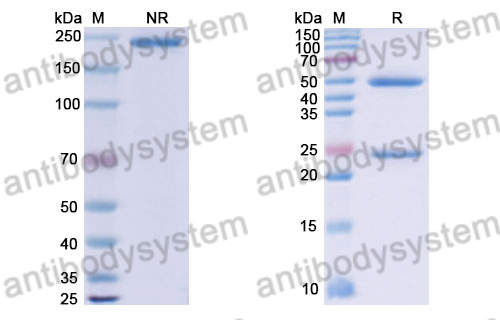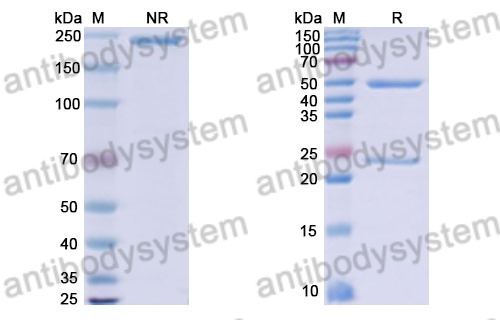Catalog No.
DHB91501
Expression system
Mammalian Cells
Species reactivity
Human
Host species
Human
Isotype
IgG1, kappa
Clonality
Monoclonal
Target
ETGF, Protransforming growth factor alpha, TGF type 1, TGFA, EGF-like TGF, TGF-alpha
Concentration
1 mg/ml
Endotoxin level
Please contact with the lab for this information.
Purity
>95% as determined by SDS-PAGE.
Purification
Protein A/G purified from cell culture supernatant.
Accession
P01135
Applications
Research Grade Biosimilar
Form
Liquid
Storage buffer
0.01M PBS, pH 7.4.
Stability and Storage
Use a manual defrost freezer and avoid repeated freeze-thaw cycles. Store at 4°C short term (1-2 weeks). Store at -20°C 12 months. Store at -80°C long term.
Clone ID
LY3016859
An antibody-drug conjugate targeting soluble and membrane-bound TGFα is effective against pancreatic tumors., PMID:40410803
Hypoxia-inducible factor pathway genes predict survival in metastatic clear cell renal cell carcinoma., PMID:35973929
Identification of Growth Factors, Cytokines and Mediators Regulated by Artemisia annua L. Polyphenols (pKAL) in HCT116 Colorectal Cancer Cells: TGF-β1 and NGF-β Attenuate pKAL-Induced Anticancer Effects via NF-κB p65 Upregulation., PMID:35163520
Long-Term Elevated Inflammatory Protein Levels in Asymptomatic SARS-CoV-2 Infected Individuals., PMID:34603283
Altered proTGFα/cleaved TGFα ratios offer new therapeutic strategies in renal carcinoma., PMID:34399807
Menetrier's disease. A diagnostic and therapeutic challenge., PMID:34137712
Ovarian cancer cells direct monocyte differentiation through a non-canonical pathway., PMID:33069212
The epigenetic treatment remodel genome-wide histone H4 hyper-acetylation patterns and affect signaling pathways in acute promyelocytic leukemia cells., PMID:33045196
The dichotomous role of epiregulin in pain., PMID:31917773
Development and Validation of a Test to Monitor Endoscopic Activity in Patients With Crohn's Disease Based on Serum Levels of Proteins., PMID:31711925
Glucocorticoid Receptor Modulates EGFR Feedback upon Acquisition of Resistance to Monoclonal Antibodies., PMID:31052457
Mesothelin and TGF-α predict pancreatic cancer cell sensitivity to EGFR inhibitors and effective combination treatment with trametinib., PMID:30921351
HER2 Activation Factors in Arsenite-Exposed Bladder Epithelial Cells., PMID:30137596
Elevated serum eosinophil cationic protein and transforming growth factor-α levels in a patient with pemphigus vegetans., PMID:29862541
Evaluation of the Safety, Pharmacokinetics, Pharmacodynamics, and Efficacy After Single and Multiple Dosings of LY3016859 in Healthy Subjects and Patients With Diabetic Nephropathy., PMID:29385323
Role of TGF-alpha in the progression of diabetic kidney disease., PMID:28249836
MiR-374a suppresses lung adenocarcinoma cell proliferation and invasion by targeting TGFA gene expression., PMID:27207663
Genetic deletion of osteopontin in TRAMP mice skews prostate carcinogenesis from adenocarcinoma to aggressive human-like neuroendocrine cancers., PMID:26700622
Formation of vascular network structures within cardiac cell sheets from mouse embryonic stem cells., PMID:31245454
Gene expression markers of efficacy and resistance to cetuximab treatment in metastatic colorectal cancer: results from CALGB 80203 (Alliance)., PMID:25520391
Generation and activity of a humanized monoclonal antibody that selectively neutralizes the epidermal growth factor receptor ligands transforming growth factor-α and epiregulin., PMID:24518034
Infliximab restores the dysfunctional matrix remodeling protein and growth factor gene expression in patients with inflammatory bowel disease., PMID:24378596
44-plex cytokine profile of cholesteatoma., PMID:24256045
Biomarkers of benefit from cetuximab-based therapy in metastatic colorectal cancer: interaction of EGFR ligand expression with RAS/RAF, PIK3CA genotypes., PMID:23374602
[Expressions of receptor tyrosine kinases mRNA and protein in carcinoma of bladder]., PMID:21906447
Epidermal growth factor receptor intron 1 CA dinucleotide repeat polymorphism and survival of advanced gastric cancer patients treated with cetuximab plus modified FOLFOX6., PMID:20047592
Anti-IL5 decreases the number of eosinophils but not the severity of dermatitis in Sharpin-deficient mice., PMID:19650867
Ethanol-TGFalpha-MEK signaling promotes growth of human hepatocellular carcinoma., PMID:19321179
[Connective tissue growth factors, CTGF and Cyr61 in drug-induced gingival overgrowth--an animal model]., PMID:20209781
TGF alpha has low protein expression in nonsyndromic clefts., PMID:17993868
Tumor necrosis factor regulation of apoptosis in mouse preimplantation embryos and its antagonism by transforming growth factor alpha/phosphatidylionsitol 3-kinase signaling system., PMID:17182889
Differential gene expression analysis reveals generation of an autocrine loop by a mutant epidermal growth factor receptor in glioma cells., PMID:16424019
Survivin contributes to the anti-apoptotic activities of transforming growth factor alpha in mouse blastocysts through phosphatidylinositol 3'-kinase pathway., PMID:16079309
Gastrin-releasing peptide receptor mediates activation of the epidermal growth factor receptor in lung cancer cells., PMID:15967120
Ionizing radiation-induced mitogen-activated protein (MAP) kinase activation in DU145 prostate carcinoma cells: MAP kinase inhibition enhances radiation-induced cell killing and G2/M-phase arrest., PMID:10760996
The rationale and strategy used to develop a series of highly potent, irreversible, inhibitors of the epidermal growth factor receptor family of tyrosine kinases., PMID:10495354
Eradication of established tumors by a fully human monoclonal antibody to the epidermal growth factor receptor without concomitant chemotherapy., PMID:10096554
EGFR blockade by tyrosine kinase inhibitor or monoclonal antibody inhibits growth, directs terminal differentiation and induces apoptosis in the human squamous cell carcinoma HN5., PMID:9664130
Epidermal growth factor receptor (EGFR) in oral squamous cell carcinomas: overexpression, localization and therapeutic implications., PMID:9495132
Differential expression of transforming growth factor alpha, adhesions molecules and integrins in primary, metastatic liver tumors and in liver cirrhosis., PMID:7539239
p53 overexpression correlates with increased survival in patients with squamous carcinoma of the tongue base., PMID:1463117


